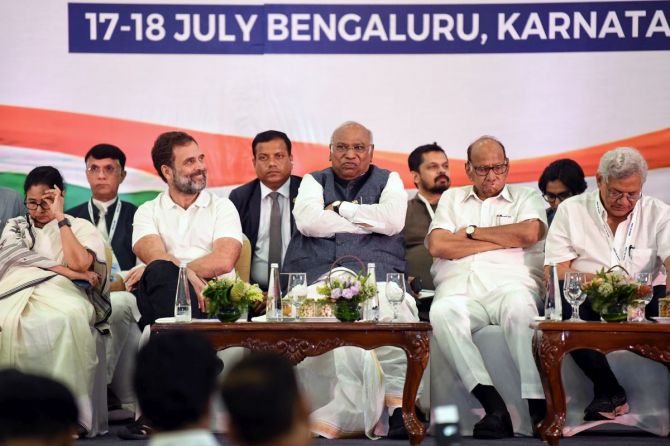After sealing the SP-Congress deal in Uttar Pradesh (UP), the “India bloc” faces both opportunities and challenges as it strategizes its next steps. This alliance between the Samajwadi Party (SP) and the Indian National Congress (INC) has significant implications for the political landscape of Uttar Pradesh and beyond.
Firstly, the SP-Congress alliance strengthens the opposition’s position in UP against the incumbent Bharatiya Janata Party (BJP). By joining forces, these parties aim to consolidate anti-BJP votes and present a united front to challenge the ruling party. This could lead to a more competitive electoral contest, potentially altering the traditional dynamics of Uttar Pradesh politics.

SOURCE:- NEWS18
Moreover, the alliance reflects a broader trend of opposition parties coming together to counter the dominance of the BJP. In recent years, there has been a growing recognition among opposition parties of the need to set aside ideological differences and prioritize electoral success. The SP-Congress deal exemplifies this trend and could serve as a model for future alliances in other states and at the national level.
SOURCE:- INDIA TODAY
However, while the alliance offers opportunities, it also presents challenges for the India bloc. One such challenge is the management of internal dynamics within the alliance. Both the SP and the Congress have their own support bases, leaders, and agendas. Balancing these interests and ensuring cohesion within the alliance will be crucial for its success. Any internal conflicts or disagreements could undermine the effectiveness of the alliance and benefit the BJP.
Another challenge for the India bloc is to effectively communicate its agenda and vision to the electorate. Beyond simply being anti-BJP, the alliance needs to articulate a compelling alternative vision for governance and development in Uttar Pradesh. This requires effective messaging, grassroots mobilization, and a clear articulation of policies and priorities that resonate with voters.
Furthermore, the India bloc must navigate the complex caste and identity politics that characterize Uttar Pradesh. The state’s electoral landscape is shaped by intricate caste equations, and any successful electoral strategy must account for these dynamics. The alliance will need to reach out to various caste groups, build coalitions, and address the concerns and aspirations of different communities.
the SP-Congress alliance in Uttar Pradesh represents a significant development in Indian politics. It has the potential to alter the electoral dynamics in the state and contribute to the broader opposition movement against the BJP. However, the alliance also faces challenges, including managing internal dynamics, communicating effectively with voters, and navigating complex caste politics. The success of the India bloc will depend on its ability to address these challenges and present a compelling alternative to the ruling party.
Share your views in the comments

